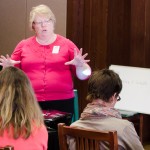When we were kids, we had no problem accessing our imaginations.
We also had no Internet, barely any TV (I remember a whopping FIVE channels!), and video games? Fuhgettaboutit.
When we wanted to have fun, we had to make that sh*# UP. I remember creating whole fantasy worlds with my friends where we played for hours on end. Our ability to invent magical adventures was unmatched by any standards I’m able to meet today. But thank gawd for the Internet.
Now that I’m older, my brain tends to stumble over itself when ever I “search” my own archives for something particularly creative.
When I’m unable to call forward the answers I need, the trusty Internet (usually mediated through the all-knowing Google) helps me find what I’m looking for.
And it’s not just me. More and more of us are turning to Google (or some other fabulous database in the clouds) when we need answers.
Answers to hard questions (how do you build a tree house?). And answers to silly questions (who is that guy on SVU and where have I seen him before?).
Yep. They’re all in there. Especially when you need something totally off-the-wall to make your project sing.
Brainstorm Using Search
I’ve performed some “weird” searches to help me with my business. Especially with the writing. See if any of these help you the next time you get stuck.
1. What rhymes with…? Back in college, I had one of those analog rhyming dictionaries. (You know…a book.) It’s a tool more commonly used by poets. Nowadays, if I’m trying to find a word for a title or a product name, my brainstorming usually takes me to rhymezone.com. You can type in any word and get back multiple choices.
2. What words start with…? More naming challenges. This time I was looking for something I could use for alliterative purposes. (Creating names-of-the-week themes for my social media calendar. Did you catch Marmalade Monday earlier this week?) Just complete that question with the letter you’re looking for and you’ll get a whole slew of ideas.
3. I need help with …? This one is good for seeing what the heck people are having problems with. (Hint: so you can create a product or service to solve it.) I usually do this one on Twitter and Facebook. But I’ve also got Google Alerts set up to send me juicy nuggets on a daily basis, too.
Fun fact: if you do that search in Facebook, make sure to select the Public Posts filter on the left side of the search results window. You can then see all the posts by folks asking for help.
4. Is there an app for that? or a plugin? or, you know…a tool? The world is full of genius inventors. And usually someone, somewhere has figured out how to do something faster or easier than you’re doing it right now. And if you’re working on a big project, you don’t want to reinvent the wheel. Just this past week, I searched for “How can I pull together multiple blog posts into one blog” and wa~la! I found this post with 10 great ideas. Now we’re cookin with gas, baby!
5. Random input. First you start by stating the problem or question. (Write it at the top of a piece of paper, or create a new document and use that as your title.) Now, open a search window and type in a word or phrase from your statement. See what pops up. Click on the images filter (on the left side of the search results screen). What do the results and your problem have in common? What does this new input suggest for you? What else could it lead to? If you want to get really random input, try a random word generator.
Fun fact: When Campbell’s Soup was brainstorming new ideas for soup products they used the random word tool. I wasn’t there so I don’t know the exact sequence of words that came out of the brainstorming session. Here’s my take on what happened. Campbell’s was looking for a new kind of soup or an expansion to their current product line. They used the random word tool and started with the word “apartment.” Then they brainstormed around that word. No logic, they just let the ideas flow – apartment lead to building, build, tools, hammer, saw, drill, knife, which eventually lead to fork. Someone on team said, “You can’t eat soup with a fork. It would have to be in chunks to do that.” And that’s (supposedly) how Chunky Soup was born.
6. Just the right image. Many times, my blog posts and articles are inspired by a photo or illustration first. I love to feed by brain with images and when I can’t get out to see the latest exhibition at the local art museum, I peruse them online. If you start with a general topic (in my case, “food” or “cooking”) and do image searches using flickr or google, you’ll find some truly amazing stuff. Stock photo houses are even better because they allow you to create lightboxes where you can save images in category sets for later use (see istockphoto.com or dreamstime.com as starting points).
Fun Fact: the Creative Commons is a great place to search for free images and other media you can use on your blog. You can also use the Commons search on Flickr.
7. What’s trending? This is a great way to see what’s being searched for by others. Google Trends serves up data about current search volume as well as historical searches. These can help you add some interesting tidbits to your copy or even spark ideas for whole articles.
Fun Fact: Google Zeitgeist is like a yearbook for web searches. Every year, Google shows us what’s been most popular across all sorts of different topic areas — in a visual format that’s fun to peruse.
8. What if? When you’re trying to innovate a new product or service, it’s helpful to ask as many what if questions as you can. What if this widget smelled? What if our customer was a Pisces? Your answers help you think about your challenge in a new way. Stuck for questions to ask? Try typing in any variation of a question you can think of (“What if my widget smells”) and see what pops up. These can spark other questions that you can follow down a rabbit hole. (Caution! Make sure you set a timer first.)
9. What’s the relationship? I found this tool called Watizit that helps you generate ideas using abstract graphics. Most of us tend to conceptualize things in patterns we’re comfortable with (e.g. words or numbers). This fun tool helps trigger connections that will take you outside your normal paths of thought. Plus, it’s just plain fun.
10. Advanced searches. If you’re trying to find stuff that’s related to a website you’ve already found, try Google’s alternative query. Just type related:URL in the search box and you’ll get websites similar in content. For more fabulous fun with Google, check out this handy reference guide for doing other advanced searches.
Other Tools
11. Check out the American Creativity Association’s website. (I know! Who knew, right?) They’ve got lots of fun stuff including a whole section of tools to help you reconnect with your creativity.
12. Capture all that fabulous output in a mind map. Not only will you be better able to organize your thoughts later, but the tool itself helps spur creative (non-linear) thought. There are a ton of free mind mapping tools online. I like Spicynodes.org.
13. From digital to analog. If you’re a tactile kind of person, you may want something you can actually touch (other than your keyboard). In that case, check out InnovationTools.com. They’ve got a boat load of great tools you print out and use in your 3-dimensional world.
14. Feed your noodle. If you’re like me, you already subscribe to 3 dozen more email newsletters than you’ll ever read. But I read this one without fail: Springwise.com. They cull news stories from around the world about totally unique businesses and product ideas.
15. Take a shower. Okay, this one is NOT related to the Web. But it does work extremely well. You know how you always get your best ideas when you’re taking a shower or driving across town? Inconvenient, right? Well, the power behind our showers is that they help us relax. Specifically, they induce a particular brain wavelength called “Alpha” waves and scientists have found those are the waves that lead most often to flashes of creative insight and inspiration. So step away from your desk and go relax. Just bring a note pad with you (or, if you’re in the shower, a diver’s slate) so you can capture all that brilliance.
What did I miss? Do you have any suggestions for weird searches or other online tools that help us get our creative juices flowing? Please share!











I came across this in a strange way. First, I stumbled across Pajama Productivity from the creators commet on EntertainmentWeekly.com. On her website, I saw your comment, clicked your name and came here. And your website ROCKS. This list is as good or better than the one over on Pajama Productivity, and I’ll be visiting again. Good work.
Intriguing concept – and one I will definitely use in the future. My only caveat, I love learning new things and can end up on major tangent 5 branches away from what I originally started researching or doing. I do #6 too, although usually mine is created with a tie in to my finance mascots or villains.
I’ve never heard that Campbell’s Soup story, but that’s one of my new favorites.Mind maps run my life. I haven’t stopped mindmapping since I discovered MindNode (mac only). It’s fantastic – I use it to outline all my blog posts, outline my new book ideas, outline my websites, outline client project plans… everything.
What GREAT resources you’ve dished out to all of us! i’m loving the “Fun Fact” asides…cute and super-useful! i think you have a near-perfect record of me printing out your posts and taping them to my wall. This is getting unsustainable… 🙂
LOL – it always surprises me to find out there are actually people who don’t rely on Google like I do. It used to be, if you had a question, you asked your Mom (you called her up, and said “Hey Mom, how long am I supposed to cook a 3 lb roast, again?”) Now, I just Google it. Sometimes I refer to it as “Google-Mama.” (I’m SO glad my mother doesn’t read this blog!)
Holy merde, Tea. So many awesome tools here I may explode my Evernote account. AWESOME sauce, Chef.
Taking a shower SO works. Not even necessarily in terms of creativity for me…but in terms of getting set to actually work. Sometimes when I wake up I hope right online to check email and do some reading…but then it comes time to actually produce and I can’t. I feel like taking a shower is almost like hitting a re-set button.And what is this “book” thing you speak of in the first point?
Love these ideas, Tea. Taking a shower works well. I’ve often thought of keeping a waterproof pen and small whiteboard handy. 🙂 On another note, that post on pulling different feeds together is golden! – Thanks for that.
What a treasure chest of stimulation sources. If we follow all these ideas we’ll have to give up any other work and become prolific writers. It’s amazing what you come up with. This creates brainstorm-whirlwind-itis. Yes, I caught Marmelade Monday and wondered “where did THAT come from?”Before this by best ideas input department was the shower. So much to bookmark and learn!
What a treasure chest of stimulation sources. If we follow all these ideas we’ll have to give up any other work and become prolific writers. It’s amazing what you come up with. This creates brainstorm-whirlwind-itis. Yes, I caught Marmelade Monday and wondered “where did THAT come from?”Before this by best ideas input department was the shower. So much to bookmark and learn!
Amazing. Every idea is a great one. Now the challenge is to go back to our productivity Word Carnival from last month, and work out how to implement them all in our daily lives. Actually, all I want to do now is go play! You don’t have to go far on your site to witness creativity. It pours out of every pixel. This is definitely a post we should all bookmark for instant right brain access. Thank you Tea
OMG Tea…so very true. I remember being excited about color TV…now I have the nerve to not be happy when it’s not HD through HDMI okay! I was helping a friend on her computer recently and she was trying to figure something out and I said let’s type it on Google and see what we get…she was like wow…had not thought of just putting the question there..I looked really smart :). Definitely going to utilize your suggestions! Love the word carnival!